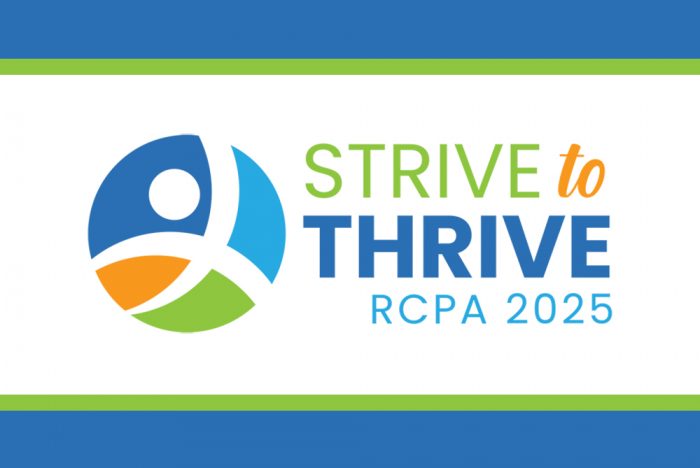- Over sixty workshops that tackle the latest in technology, workplace culture, and health care initiatives;
- National keynote and plenary speakers who will discuss issues ranging from the federal landscape to personal well-being;
- Networking opportunities in Connections Hall, featuring over 90 exhibitors with the latest industry products and services (as well as some exciting game prizes!); and
- Opportunities to connect with RCPA staff and other industry leaders to discuss all that is happening in health and human services.
Join RCPA at Our 2025 Annual Conference and Stay Up-to-Date on Federal and State Policy
The field of health and human services is shifting at a rapid pace, and it is vital for providers, advocates, and legal experts to remain up-to-date on policy as well as involved in the advocacy process. Among the over sixty workshops available, the RCPA 2025 Annual Conference Strive to Thrive will be holding several workshops tackling the federal landscape. Register today and join us at the Hershey Lodge September 9 – 12, 2025, to gain access to these informative workshops, which include:
- National Outlook: The Turbulent Landscape of 2025/26
- How To Survive a Payer Billing Audit — Straight From an Auditor’s Mouth
- Expanding Revenue Beyond Medicaid: New Funding Strategies for I/DD Providers
- Building Sustainable Community Advisory Councils for Impactful Legislative Advocacy
At a local level, the RCPA Conference is working with the Department of Human Services to bring information straight to attendees, with workshops such as:
- State of the State
- Office of Developmental Programs Policy Updates and Forecast for 2026
- PA Navigate: Connecting Pennsylvanians to Needed Social Services
- Updates and Discussion With the Office of Long-Term Living
- Behavioral Health Treatment in Pennsylvania: Where We Are, Where We Are Going
Early bird registration rates end this Friday, August 8, so don’t delay in reserving your spot for these workshops and more! View our Registration Brochure for complete details of the conference schedule and speakers, and be sure to check the RCPA Conference website regularly for details and updates to the schedule, registration, and sponsors/exhibitors. Register today!![]()
Opportunities for sponsorships and advertising are still available, but EXHIBIT BOOTHS ARE OFFICIALLY SOLD OUT! We are grateful to all our sponsors and exhibitors who help make the conference happen. If your organization is interested in sponsoring or advertising at our conference, all information is available in our Sponsor, Exhibit, and Advertise Brochure. Contact Carol Ferenz, Conference Coordinator, for more details.
Rural Health Transformation Program Overview
H.R. 1 created a $50 billion fund called the Rural Health Transformation program in an attempt to offset the losses that rural health providers will experience associated with the other devastating cuts to health care in the legislation.
Each state must complete a one-time application for the five-year program to be reviewed by CMS. Many aspects of the application are still undecided, including the submission period, due date, state entity that must submit the application, and the form of the application. The RHTP application must include a plan to describe how the state would use the funds to:
- Improve access to hospitals and other providers for rural residents;
- Improve health care outcomes of rural residents;
- Prioritize the use of new and emerging technologies that emphasize prevention and chronic disease management;
- Initiate, foster, and strengthen local and regional strategic partnerships between rural hospitals and other providers to promote quality improvement, increase financial stability, maximize economies of scale, and share best practices;
- Recruit and retain clinicians,
- Prioritize data and technology driven solutions that help rural providers furnish health care services as close to the patient’s home as possible;
- Outline strategies to manage long-term financial solvency and operating models of rural hospitals; and
- Identify specific causes that are driving standalone rural hospitals to close, convert, or reduce service lines.
The funds will be distributed between 2026 and 2030, allotting $10 billion each year. $25 billion of this fund will be allocated equally among all states with an approved application by CMS. Assuming that all fifty states are approved, each state will receive a minimum of $100 million per year for five years. The other $25 billion will be distributed to states with an approved application in an amount determined by CMS based upon the state’s rural population, proportion of healthcare facilities in rural areas, and the situation of hospitals that serve a high proportion of low-income patients.
The bill lists several allowable uses of the PHTP funds:
- Promoting evidence-based, measurable interventions to improve prevention and chronic disease management;
- Providing payments to health care providers for the provision of health care items or services as specified by CMS;
- Promoting consumer-facing, technology-driven solutions for the prevention and management of chronic diseases;
- Providing training and technical assistance for the development and adoption of technology-enables solutions that improve care delivery in rural hospitals, including remote monitoring, robotics, artificial intelligence, and other advanced technologies;
- Recruiting and retaining clinical workforce talent to rural areas, with commitments to serve rural communities for a minimum of five years;
- Providing technical assistance, software, and hardware for significant information technology advances designed to improve efficiency, enhance cybersecurity capability development, and improve patient health outcomes;
- Assisting rural communities to right-size their healthcare delivery systems by identifying needed preventative, ambulatory, pre-hospital, emergency, acute inpatient care, outpatient care, and post-acute care service lines;
- Supporting access to opioid use disorder treatment services, other substance use disorder treatment services, and mental health services;
- Developing projects that support innovative models of care that include value-based care arrangements and alternative payment models as appropriate; and
- Additional uses designed to promote sustainable access to high quality rural health care services, as determined by the Administrator.
RCPA will continue to share information on the program and applications as it becomes available. Contact Emma Sharp with any questions.
CMS Issues Fiscal Year 2026 IRF Payment Rule
The Centers for Medicare and Medicaid Services (CMS) finalized the fiscal year (FY) 2026 inpatient rehabilitation facility (IRF) payment rule and published it in today’s Federal Register.
The final rule is a fairly straightforward payment and coverage rule, similar to the April 2025 proposed rule. The payment and IRF Quality Reporting Program (IRF QRP) updates are outlined below.
Payment: CMS expects an aggregate increase of $340 million in payments to IRFs across the PPS. This reflects an increase of approximately 2.6% in estimated payments, including all relevant adjustments.
Quality Reporting Program (QRP):
- CMS finalized the removal of two quality measures: (1) the COVID-19 Vaccination Coverage among Healthcare Personnel (HCP) measure, beginning with the FY 2026 IRF QRP, and (2) the COVID-19 Vaccine: Percent of Patients/Residents Who Are Up to Date measure, beginning with the FY 2028 IRF QRP. IRFs will continue to have the COVID-19 Vaccine: Percent of Patients/Residents Who Are Up to Date measure data collection item in the IRF-PAI until October 1, 2026, with CMS making the data collection voluntary and removing Q4 2025 data for this measure from the FY 2027 IRF QRP Compliance Determinations. CMS took similar action in other recently finalized payment rules. CMS also finalized their proposals to end the public display of these measures following the September 2025 Care Compare refresh.
- CMS finalized the removal of four Standardized Patient Assessment Data Elements (SPADEs) under the Social Determinant of Health (SDOH) category with the FY 2028 IRF QRP, specifically: Living Situation (R0310), Food (R0320A and R0320B), and Utilities (R0330).
- CMS finalized its procedural and review-focused changes to the IRF QRP reconsideration process. First, CMS will permit IRFs to request, and CMS to grant, an extension to file a request for reconsideration of a non-compliance determination if, during the 30-day period to request a reconsideration, the IRF was affected by an extraordinary circumstance beyond the control of the IRF (for example, a natural or man-made disaster). Second, CMS is finalizing its proposed updates to the bases on which CMS can grant a reconsideration request, providing that CMS will grant a timely request for reconsideration, and reverse an initial finding of non-compliance, only if CMS determines that the IRF was in full compliance with the IRF QRP requirements for the applicable program year.
- CMS noted that it received extensive feedback on its Requests for Information (RFI) in four separate domains: (1) future measure concepts for the IRF QRP; (2) potential revisions to the IRF Patient Assessment Instrument (IRF-PAI); (3) potential revisions to the data submission deadlines for assessment data collected for the IRF QRP; and (4) advancing digital quality measurement in IRFs.
Requests for Information:
The rule included four dedicated Requests for Information (RFI) related to the IRF QRP and IRF-PAI. The final rule summarized the comments they received on these topics but did not offer any commentary on what CMS plans to do in future work in these areas.
RCPA Members-Only Webinar “Winning With Insights” to Be Held September 3
Early Bird Registration for the RCPA Conference Ends August 8!
September 9 will be here before you know it — don’t miss your opportunity to register for the RCPA 2025 Conference Strive to Thrive and claim your early bird discount! By registering today, you guarantee your spot for over sixty workshops, live updates from both state and national partners, and inspiring keynote and plenary speakers. View our Registration Brochure for complete details of the conference schedule and speakers.
Early bird registration ends August 8, and hotel room discounts end August 11, so reserve your seat and hotel room today!
A limited number of exhibit booths and sponsorship opportunities remain! Contact Carol Ferenz, Conference Coordinator, ASAP for details if your organization is interested in sponsoring or exhibiting at our conference. All information is available in our Sponsor, Exhibit, and Advertise Brochure. The deadline for being recognized in conference materials and onsite displays is August 10, so be sure to complete your contract as soon as possible!
View our sponsors and exhibitors at our Conference website!
PHRA Releases 2025–2030 Pennsylvania Rural Health Plan
The Pennsylvania Rural Health Association (PRHA) has released the 2025–2030 Pennsylvania Rural Health Plan, which is a comprehensive roadmap to improve the health and well-being of rural residents across the state.
The plan was developed with input from rural community leaders, health professionals, academic institutions, and policymakers to identify key priority and action steps to address the unique health challenges and opportunities in Pennsylvania’s 48 rural counties. Primary focuses include access to care, behavioral health, oral health, maternal health, workforce development, broadband connectivity, and health equity.
The 2025–2030 Pennsylvania Rural Health Plan can be found here.
State Board of PT Amends Regulations for PTs and PTAs for Early Exam and CE Hours
Included in the July 7, 2025, Pennsylvania Bulletin was a notice from the State Board of Physical Therapy (PT) regarding the final-form rulemaking that allows physical therapist students and physical therapist assistant (PTA) students to sit for requisite examinations up to 90 days prior to graduation from their respective programs. It also allows PTs and PTAs to receive a limited amount of continuing education credit for providing clinical instruction to student PTs and student PTAs at clinical facilities affiliated with accredited programs.
In addition, this final-form regulation allows applicants to directly register for the national examination with the examination provider by removing the requirement that the applicant first seek the Board’s permission, and it allows applicants to sit for a third or successive examination, after two failures, without first seeking the Board’s permission.
This final-form regulation became effective on July 7, 2025.
Governor’s Office of Budget Releases Status Update on Delayed Human Services Payments
On Tuesday, July 29, the Governor’s Office of the Budget provided an update on the status of the Fiscal Year (FY) 2025/26 state budget. The update outlines projected impacts across various departments within the Department of Human Services (DHS) over the next six weeks resulting from the ongoing budget impasse. Although the Governor, Senate, and House leadership have described ongoing negotiations as respectful, they have also been described as inching along. The letter from Secretary Monson cites funding for public schools and mass transit as top challenges in finalizing a budget.
Following is a summary of payments from Pennsylvania health and human services departments that will be delayed without a budget.
Department of Aging cannot distribute:
- $12.88 million in payments to the Area Agencies on Aging, for July and August.
Department of Drug and Alcohol Programs cannot distribute:
- $9.95 million quarterly payments to the Single County Authorities.
- $187,000 quarterly payments for training of substance use disorder and problem gambling service professionals.
- $21 million quarterly payments for State Opioid Response funding.
Department of Health cannot distribute:
- $9.405 million in anticipated quarterly reimbursements to County Municipal Health Departments.
- More than $4.7 million in quarterly funding to support operation and administration of EMS services.
- $9.405 million in quarterly funding to school districts for health services.
- More than $3.466 million in quarterly payments for the Prescription Drug Monitoring Program, beginning in July.
- Payments for critical health services, including, but not limited to: Tuberculosis screening, Cystic Fibrosis, Lyme Disease and Cancer Screening, beginning in July.
- More than $1 million in quarterly payments for Maternal and Child Health services and $1.8 million in quarterly for Newborn Screening.
Department of Human Services cannot distribute:
- $15 million in quarterly advances for Behavioral Services, beginning in July.
- Quarterly advances for Breast Cancer Screening services.
- $390 million in County Child Welfare payments for July and August.
- $8.5 million in payments for Domestic Violence for July and August.
- $3.5 million in quarterly advances from the Human Services Development Fund.
- An estimated $33 million in Child Support Enforcement payments, for July and August.
- $3.4 million in payments for Rape Crisis for July and August.
- Approximately $10 million for Community-Based Family Centers for July and August.
- $5.6 million in quarterly advance payments for Homeless Assistance.
Read the letter from Secretary Monson here. If you have any questions, please contact your respective RCPA Policy Director.
Wage and Hour Division Relaunches PAID Program
The Payroll Audit Independent Determination (PAID) program is back!
Originally launched in 2018, PAID is returning with new enhancements, resources, and tools. Plus, it has now been expanded to include the Family and Medical Leave Act (FMLA).
The program has several of the same objectives as before:
- Resolve wage violations under the Fair Labor Standards Act (FLSA) and identified violations under the Family and Medical Leave Act (FMLA) quickly and without any litigation costs,
- Improve employer compliance, and
- Ensure employee back wages and FMLA remedies are paid to them – accurately and quickly.
In addition, FMLA violations can now be addressed through PAID so employers can correct errors made and employees can receive job-protected leave according to the law.
With this relaunch, DOL is encouraging proactive compliance through accessible, user-friendly resources, and web content.
DOL knows running a business is hard work. Balancing payroll, scheduling, and compliance can be a juggling act, and sometimes mistakes are made. If you’ve had errors lead to unpaid wages or FMLA leave issues, now is the chance to make it right.
For more information, visit the Division’s page on the PAID program.
















